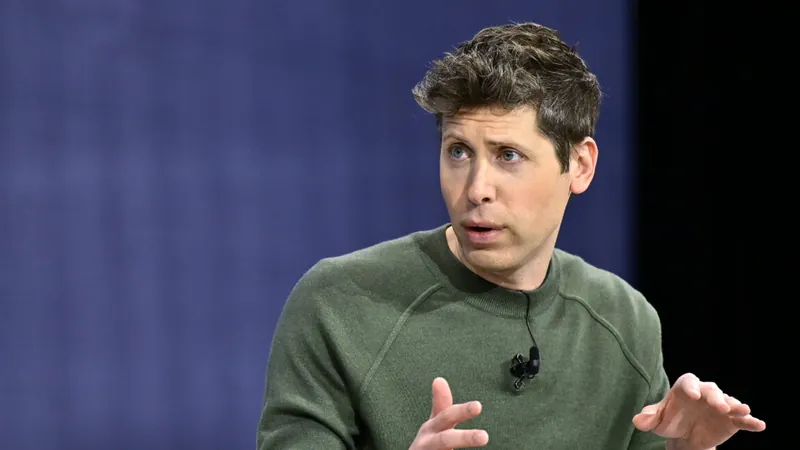
Sam Altman Reveals Bold Predictions for the Future of Artificial Intelligence: Is AGI on the Horizon?
2025-01-06
Author: Chun
Introduction
OpenAI's CEO, Sam Altman, sent shockwaves through the tech world with his recent blog post, where he declared that the company is "confident we know how to build AGI as we have traditionally understood it." This striking claim, made during a reflection on the future of artificial intelligence, has prompted both excitement and skepticism among experts and critics alike.
Predictions for 2025
In his ambitious forecast, Altman also predicted that by 2025, we could witness the first AI agents entering the workforce, significantly altering the productivity landscape of various industries. This is a pivotal assertion, especially given the rapid advancements in generative AI technologies such as ChatGPT, which has already begun influencing business operations. AI agents are designed to perform tasks on behalf of users, and mainstream adoption could revolutionize how companies function.
Critics Respond
However, such bold statements have ignited backlash from critics. Gary Marcus, a prominent adversary of OpenAI, responded ferociously on social media, accusing Altman of "spinning nonsense at unprecedented levels." Marcus raises critical concerns regarding the feasibility of Altman's predictions, which echo his long-standing skepticism toward AI models’ capabilities. Notably, critics highlight that current AI models, including OpenAI's latest, o1-pro, still struggle with fundamental tasks such as basic mathematics and commonsense reasoning.
Understanding AGI
The term AGI, or artificial general intelligence, is broadly defined at OpenAI as "highly autonomous systems that outperform humans in most economically valuable work." However, the journey toward achieving AGI remains complex. The economic implications are enormous, as AGI could potentially replace millions of jobs, shifting responsibilities from humans to machines and raising the contentious issue of labor displacement. Altman himself has suggested that universal basic income might be necessary to offset these societal changes.
Skepticism Towards AI Models
In the wake of Altman's declarations, critics have emphasized the current limitations of existing AI technologies. For instance, the o1 model's performance on specific benchmarks has come under scrutiny, revealing a disappointing score that doesn't live up to OpenAI's lofty claims. Meanwhile, the development of the o3 model has been announced, although many await its release to further evaluate its capabilities.
The Pursuit of Superintelligence
Furthermore, Altman also discussed the concept of superintelligence—a theoretical AI that could surpass human intelligence. He hinted that the company may soon shift its focus from AGI to the pursuit of superintelligent systems, which would have unprecedented potential to drive innovation and scientific discovery.
Conclusion
Despite the skepticism, there's no denying that Altman has been a catalyst for change in the tech industry. Since the launch of ChatGPT, AI has become ingrained in public consciousness, marking a significant shift in how technology is perceived and utilized in everyday life. Altman concluded his reflections by reminiscing on OpenAI's origins and the early doubts the company faced, reaffirming his commitment to pursuing advancements in technology to create a profound societal impact.
As we stand on the brink of a technological revolution, the conversation around AGI, superintelligence, and the future of work has never been more critical. Will Sam Altman's vision come to fruition, or is it merely wishful thinking? Only time will tell, but one thing is for sure: the race toward advanced AI is heating up, and the implications for our world could be monumental.

 Brasil (PT)
Brasil (PT)
 Canada (EN)
Canada (EN)
 Chile (ES)
Chile (ES)
 Česko (CS)
Česko (CS)
 대한민국 (KO)
대한민국 (KO)
 España (ES)
España (ES)
 France (FR)
France (FR)
 Hong Kong (EN)
Hong Kong (EN)
 Italia (IT)
Italia (IT)
 日本 (JA)
日本 (JA)
 Magyarország (HU)
Magyarország (HU)
 Norge (NO)
Norge (NO)
 Polska (PL)
Polska (PL)
 Schweiz (DE)
Schweiz (DE)
 Singapore (EN)
Singapore (EN)
 Sverige (SV)
Sverige (SV)
 Suomi (FI)
Suomi (FI)
 Türkiye (TR)
Türkiye (TR)
 الإمارات العربية المتحدة (AR)
الإمارات العربية المتحدة (AR)